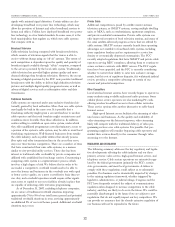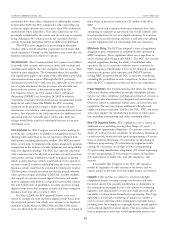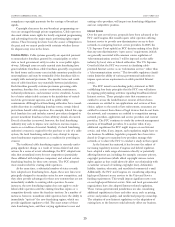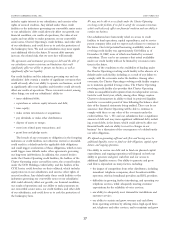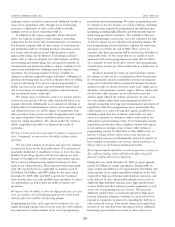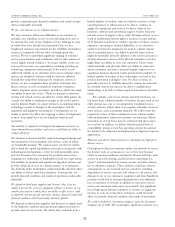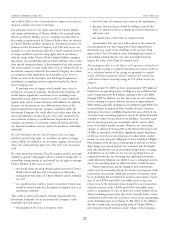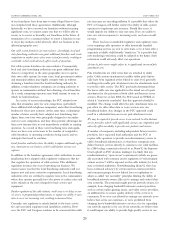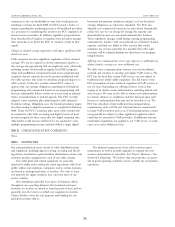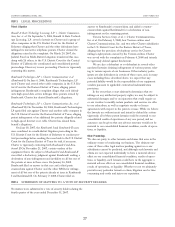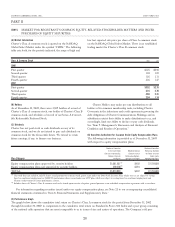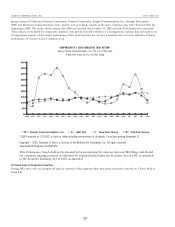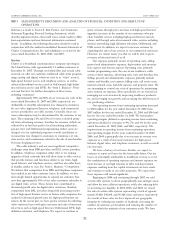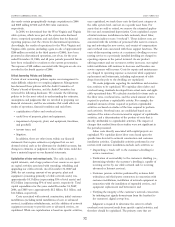Charter 2007 Annual Report Download - page 33
Download and view the complete annual report
Please find page 33 of the 2007 Charter annual report below. You can navigate through the pages in the report by either clicking on the pages listed below, or by using the keyword search tool below to find specific information within the annual report.
and would be likely to have a material adverse impact on our growth,
financial condition and results of operation.
Our principal assets are our equity interests in Charter Holdco
and certain indebtedness of Charter Holdco. If our membership
interest in Charter Holdco were to constitute less than 50% of
the voting securities issued by Charter Holdco, then our interest
in Charter Holdco could be deemed an “investment security” for
purposes of the Investment Company Act. This may occur, for
example, if a court determines that the Class B common stock is
no longer entitled to special voting rights and, in accordance
with the terms of the Charter Holdco limited liability company
agreement, our membership units in Charter Holdco were to lose
their special voting privileges. A determination that such interest
was an investment security could cause us to be deemed to be an
investment company under the Investment Company Act, unless
an exemption from registration were available or we were to
obtain an order of the Securities and Exchange Commission
excluding or exempting us from registration under the Invest-
ment Company Act.
If anything were to happen which would cause us to be
deemed an investment company, the Investment Company Act
would impose significant restrictions on us, including severe
limitations on our ability to borrow money, to issue additional
capital stock, and to transact business with affiliates. In addition,
because our operations are very different from those of the
typical registered investment company, regulation under the
Investment Company Act could affect us in other ways that are
extremely difficult to predict. In sum, if we were deemed to be
an investment company it could become impractical for us to
continue our business as currently conducted and our growth,
our financial condition and our results of operations could suffer
materially.
If a court determines that the Class B common stock is no longer
entitled to special voting rights, we would lose our rights to manage
Charter Holdco. In addition to the investment company risks discussed
above, this could materially impact the value of the Class A common
stock.
If a court determines that the Class B common stock is no longer
entitled to special voting rights, Charter would no longer have a
controlling voting interest in, and would lose its right to manage,
Charter Holdco. If this were to occur:
kwe would retain our proportional equity interest in Charter
Holdco but would lose all of our powers to direct the
management and affairs of Charter Holdco and its subsidiar-
ies; and
kwe would become strictly a passive investment vehicle and
would be treated under the Investment Company Act as an
investment company.
This result, as well as the impact of being treated under the
Investment Company Act as an investment company, could
materially adversely impact:
kthe liquidity of the Class A common stock;
khow the Class A common stock trades in the marketplace;
kthe price that purchasers would be willing to pay for the
Class A common stock in a change of control transaction or
otherwise; and
kthe market price of the Class A common stock.
Uncertainties that may arise with respect to the nature of
our management role and voting power and organizational
documents as a result of any challenge to the special voting
rights of the Class B common stock, including legal actions or
proceedings relating thereto, may also materially adversely
impact the value of the Class A common stock.
For tax purposes, there is a risk that we will experience a deemed own-
ership change resulting in a material limitation on our future ability to
use a substantial amount of our existing net operating loss carryfor-
wards, and future transactions and the timing of such transactions
could cause a deemed ownership change for U.S. federal income tax
purposes.
As of December 31, 2007, we have approximately $7.9 billion of
federal tax net operating losses, resulting in a gross deferred tax
asset of approximately $2.8 billion, expiring in the years 2008
through 2027. In addition, we also have state tax net operating
losses, resulting in a gross deferred tax asset of approximately
$358 million, generally expiring in years 2008 through 2027. Due
to uncertainties in projected future taxable income, valuation
allowances have been established against the gross deferred tax
assets for book accounting purposes, except for deferred benefits
available to offset certain deferred tax liabilities. Currently, such
tax net operating losses can accumulate and be used to offset
most of our future taxable income. However, an “ownership
change” as defined in Section 382 of the Internal Revenue Code
of 1986, as amended, would place significant annual limitations
on the use of such net operating losses to offset future taxable
income we may generate. Although we have instituted a Rights
Plan designed with the goal of attempting to prevent an owner-
ship change, we cannot provide any assurance that the Rights
Plan will actually prevent an ownership change from occurring.
A limitation on our ability to use our net operating losses, in
conjunction with the net operating loss expiration provisions,
could effectively eliminate our ability to use a substantial portion
of our net operating losses to offset any future taxable income.
Future transactions and the timing of such transactions
could cause an ownership change for income tax purposes. Such
transactions may include additional issuances of common stock
by us (including but not limited to issuances upon future conver-
sion of our 5.875% and 6.50% convertible senior notes), the
return to us of the borrowed shares loaned by us in connection
with the issuance of the 5.875% and 6.50% convertible senior
notes, or acquisitions or sales of shares by certain holders of our
shares, including persons who have held, currently hold, or may
accumulate in the future five percent or more of our outstanding
stock (including upon an exchange by Mr. Allen or his affiliates,
directly or indirectly, of membership units of Charter Holdco
into Charter’s Class B common stock). Many of the foregoing
CHARTER COMMUNICATIONS, INC. 2007 FORM 10-K
22


